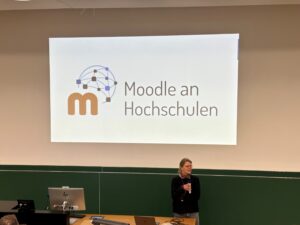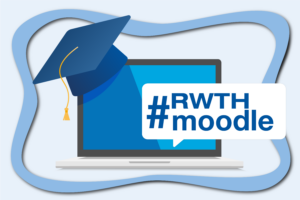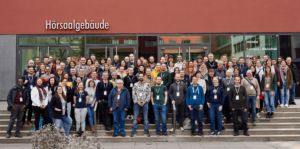Current Developments & Trends –
Video Subtitling, Digital Exam Viewing and Organization of the Moodle Community
ChatGPT and Large Language Models – how they change teaching, learning and working. At the Moodle University Meeting at Leipzig University, there was a lot of discussion about generative AI and its application scenarios in university teaching. Nevertheless, there was still enough room for other exciting topics: from Moodle quizzes and the integration of Jupyter notebooks in Moodle to service strategies, plugin lifecycles and community work to accessibility, a wide range of topics was represented. RWTH Aachen University was also among the 120 participants with two people from the IT Center and the Center for Teaching and Learning Services (CLS) and supplemented the program with two presentations and a co-moderation.
Product Advisory Group for Moodle LMS Community
The topic of the first presentation was the Product Advisory Group (PAG) for the Moodle LMS Community, which was founded in August 2023. In this group, the global Moodle community can have a direct influence on the further development of the learning management system. This is where the product roadmap and the prioritization of the next development steps are validated and design concepts for revised or new features are discussed. In addition, institutions and individuals who would like to make a financial contribution to the further development of the open source software can co-finance future development projects via a new fundraising portal. The group is open to all users of the Moodle LMS.
The aim of the presentation was to make the PAG better known in the German university community and to promote its involvement there as an individual institution or coordinated as a well-organized sub-community from Germany, Austria and Switzerland. RWTH Aachen University is already a member of the PAG.
Exam Scan – Digital Viewing of Paper Pencil Exams
In the second presentation, RWTH Aachen University presented the self-developed Moodle plugin “Exam Scan”. This allows digital insights for paper pencil exams to be implemented via the task activity available as standard in Moodle.
 Exam Scan inserts QR codes with matriculation number and page number into a PDF-based exam template and reproduces it. The exam sheets can then be downloaded and printed out for the exam. The finished exams are later scanned using the photocopiers available at the chairs and converted into PDFs. The scan file is uploaded to the learning room, distributed to the students booked in the learning room using the QR codes and made available to them individually for viewing. The plugin will be piloted in March 2024 in an examination by the Chair of Controlling at RWTH and further improved based on practical experience.
Exam Scan inserts QR codes with matriculation number and page number into a PDF-based exam template and reproduces it. The exam sheets can then be downloaded and printed out for the exam. The finished exams are later scanned using the photocopiers available at the chairs and converted into PDFs. The scan file is uploaded to the learning room, distributed to the students booked in the learning room using the QR codes and made available to them individually for viewing. The plugin will be piloted in March 2024 in an examination by the Chair of Controlling at RWTH and further improved based on practical experience.
More Accessibility in University Teaching – Automatic Video Subtitling
The Ordinance on the Creation of Accessible Information Technology under the Disability Equality Act (BITV 2.0) stipulates that public bodies must design the content of their websites to be accessible. This includes documents as well as video content. Among other things, these must be provided with subtitles in order to be usable for hearing-impaired people. Some universities, such as the Fern-Universität Hagen or the Humboldt-Universität zu Berlin, have already created ways to (partially) automatically add subtitles to lecture recordings and other educational videos that are made available to students.
In the presentation in Leipzig, Humboldt-Universität zu Berlin, co-hosted by RWTH Aachen University, presented its model for subtitling and discussed the different requirements and performance features of licensed solutions such as AmberScript or open source solutions such as VOSK and OpenAI Whisper. As it turned out, the experiences of the participants were largely congruent. Some of the available solutions are powerful, but do not (yet) deliver perfect results. If this is to be achieved, manual reworking is always required to eliminate misunderstood names, incorrectly reproduced technical terms and other errors such as incorrectly set time stamps.
The Moodle University Meeting in Leipzig highlights the ever-changing landscape of higher education. It highlights the importance of innovation and adaptability to meet changing demands. The discussions showed that the promotion of accessibility and the integration of new technologies are essential topics to create an inclusive educational environment. We are already looking forward to the next meeting and the many important changes that await us.
Want to learn more about RWTHmoodle?
Read our blog posts and use our detailed documentation on IT Center Help.
In addition, the IT-ServiceDesk is available for problems and further questions. You are also welcome to use the chat. You can find it on RWTHmoodle, the IT Center Website and on IT Center Help in the lower right corner.
Responsible for the content of this article is Harald Schnurbusch.







Leave a Reply